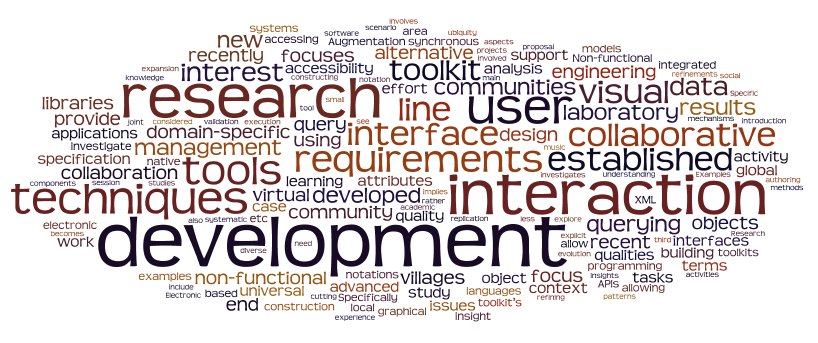Research interests
User interface development tools: This line of research focuses on detailing advanced techniques for manipulating diverse collections of interaction objects and building tools for semi-automatic compilation of user interface specifications using device-independent markup languages. Specific research areas cover introduction of new interaction techniques in established toolkit libraries, development of domain-specific interaction components to suit alternative metaphorical representations, interoperation between established toolkits and third party graphical libraries and the development of collaborative toolkit libraries and APIs. In recent years, the laboratory has established liaisons with leading research laboratories abroad and research consortia in an effort to engage in joint developments of cutting edge technologies and user interface development tools. One such joint effort is with Harmonia consortium on UIML.
Computer-mediated collaboration: This activity covers both design-oriented aspects and development tools for synchronous collaboration. With regards to design, we study architectural aspects of collaborative applications as well as rendering non-collaborative applications in collaborative contexts. As for the development of such applications we are building dedicated tools for session management, multi-platform object replication models, and corresponding APIs. The running case studies investigate a variety of synchronous collaboration scenarios in communities of practice and focus on the study of multi-user widgets, activity notification and awareness, feedback and feedthrough models and the development of novel interaction metaphors for presenting collaborative artifacts. In some of these scenarios we examine multimodal interaction in collaborative settings.
Visual querying mechanisms: Visual querying systems provide alternative interactive embodiments for accessing and manipulating databases. Our work focuses on the development of graphical techniques suitable for accessing data in object-relational database management systems. Recent case studies explored conversational querying, dynamic querying mechanisms, starfield displays, movable filters και treemaps in data-intensive applications. Our specific interest is in designing interaction techniques which afford unfolding patterns in spatial and temporal data. We also study value-added to the end user as the need for ‘knowing’ a classical query language such as SQL or the logical structure of data is no longer a prerequisite. Research prototypes employing techniques such as the above have been developed for accessing medical data, on-line libraries and geographical / regional data.
Electronic villages of local interest and on-line communities: Electronic villages are considered as domain-specific virtual organizations with strong social links between multi-sector community groups – frequently referred to as coalitions or squads – and a focus on performing tasks to yield added-value products and services. The laboratory is leading a research and development consortium co-funded by the General Secretariat of Research & Technology, Greek Ministry of Development, aiming to explore cutting edge technologies for constructing sustainable electronic villages of local interest and demonstrating the results in a pilot case study on regional tourism. Specific research and development issues being investigated include infrastructure and organizational models for such virtual constructions, policy-related issues, social interaction amongst members, knowledge persistency, active and situated learning and experience reuse. Technologies supporting the operation of electronic villages are also being developed with an emphasis on collaborative workflows, domain-specific experience specification languages, community interfaces, collaboration APIs and multiple user interfaces.
Human Computer Interaction design: This is a main line of research and development activities in the laboratory. It addresses the development of methodological tools and techniques for requirements engineering, analysis and construction of advanced user interfaces. The laboratory is involved in a range of small- and large-scale research and development projects which support this line of research and provide a context of validation and experimentation. Recently, the focus is on the advancement of a complete design proposal to allow systematic insights to the global execution context of computer-mediated tasks. To this end scenario-based methods and computer-based visual notations and tools are developed to support integrated scenario management (recording, refinement and evolution).
Non-functional requirements engineering: Non-functional requirements have only recently attracted the interest and attention of research and academic communities. Our work in this area focuses on goal-oriented analysis of global software qualities. Specifically, we investigate techniques for refining non-functional qualities in terms of established quality attributes in an effort to establish requirements for user interface engineering. A recent line of activity investigates universal accessibility and explores alternative context-oriented refinements in terms of established and new (or less established) quality attributes. This serves the purpose of understanding and gaining insight into the relationship between universal accessibility and portability, personalization, ubiquity, etc. A visual notation and an authoring tool has recently been developed allowing modeling of non-functional requirements and their specification using XML.

